Realm Makers: Go Beyond The Blogs
Incarnation. It’s a wonderful thing. When God foreknew His plan to save His world and His people, He in Christ came in the flesh, with a Face. His people must do the same, embodying His beauties and truths in our lives. This is also why we love stories — because as good as nonfiction can be, stories incarnate His beauties and truths, showing what they look like.
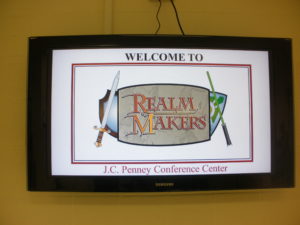 And this is exactly why I’m excited about the recent inaugural Realm Makers conference.
And this is exactly why I’m excited about the recent inaugural Realm Makers conference.
It’s a greater chance to put flesh on the “spirit.” To make the theory reality. To take all these years and megabytes’ worth of author,- agent,-and-craft encouragements, genre-lamenting sites, niche groups, and other digital disembodied communications, and incarnate them.
To me, Realm Makers revealed a chance to go beyond the blogs.
Potential plotline
Notice I said revealed a chance. We haven’t Arrived. No one argues that. No one should.
There may never come some mystical Portal point at which Christian spec-fic authors and publishers finally break through and find that vast teeming audience they’ve always known is just around the corner, that fantastic world beyond that obstinately solid wardrobe wall.
But surely such a time will never come so long as fans/authors keep doing the following:
- Treating Christian spec-fic as a “weird” niche market, rather than a reflection of God’s Story Prime on which all popular fantastic heroes’ journeys are based in the first place.
- Focusing our online conversations on craft-of-writing-and-selling tips and tricks, or what I’ve elsewhere called “writicism.”1 Here I dare a sports-related metaphor (sports is Rebecca Miller’s department): What if aspiring sports fans only ever found online information about exactly how to maximize your daily pushups or which energy drinks are best for your game training? Boring. I understand sports fans do enjoy making their own fantasy “worlds,” but don’t sports marketers know and endorse the practice of cheerleading existing teams and teasing games’ outcomes? So we must do, not only with the inside industry sides of stories, but the stories themselves.
- Restricting our story activism to internet blogs and websites, disparate Facebook groups, and incidentally cliquish digital indie and pro-published author fandoms. We must expand into reading groups at churches, book donations to public libraries, nonfiction materials available for actual money, and in-person conferences.
Stories and substance
That last is why I’m hyped about where Realm Makers could lead, and why I’m doing some unashamed (another sports-related metaphor) cheerleading here.
Others are plausibly skeptical. The RM conference may still seem more “niche” and less serious, paranormal novelist (and brother in Christ and SpecFaith contributor) Mike Duran wrote. What help is getting together to enjoy, say, fan cosplay, when most publishers still don’t recognize readers’ need for great Biblical-worldview fantastic stories?
I’ll concede that conference attenders are more likely to cyber-share photos of themselves dressed as Doctor Who’s River Song or Harry Potter’s Prof. McGonagall, than they are to share photos or notes from classes by Bryan Davis or L.B. Graham. (We shared them all.)
But for those valuing serious substance over style, trust me, that was there. And it can only improve in the future, and in ways valuable to fans and readers as well as aspiring writers.
- Marcher Lord Press founder Jeff Gerke gives his story behind that indie effort — and incidentally also many other indie publishers’ efforts to find, sharpen, and sell Biblical-worldview fantastic fiction. Old attempts of persuading old-style evangelical companies to publish and market fantasy fiction in Christian stores — patronized by “the little old lady brigade,” Gerke affectionately says — never could have worked. Of his own former tries Gerke says, “We went to a golfing store and tried to sell … chairs.” Now is the time to take to new publishing, to write what you want to read and find its market, he says.
-
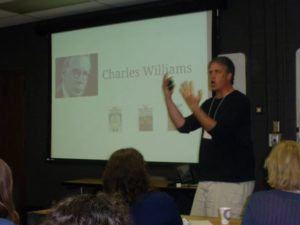
Surely fantasy novelist L.B. Graham does not mean to appear this fierce, especially not regarding Charles Williams.
Fantasy novelist L.B. Graham paces and owns the classroom, like the teacher he is, while outlining “Worldviews and World-Building.” This class alone may answer the questions: What is “Christian fiction” anyway? Do we even need it? Our worldviews matter, Graham says, and the old Christian-fiction rules of don’t-show-this and must-show-that are not wrong merely because they turn off readers, but because they’re anti-Biblical moralism.
- Gerke again, this time discussing the plot twists of Marcher Lord’s mature-materials imprint, Hinterlands, formed especially to sidestep the requirement of one group.2
- Firebird series author Kathy Tyers shares her journey of how she was in the right place and time to write Star Wars novels. A lively Q and A covers Star Wars’s likely film future and the unorthodox journey of a faithful Christian author in a secular marketplace.
- A panel of authors discussing redemptive horror, versus that other stuff, expectedly reassures me that these brothers and sisters are nowhere near the “I like it ‘cause it’s entertaining” “reasons.” They are united in their desire to glorify Christ in this genre.
- In another panel, authors discuss Biblical/craft perspectives on science and magic.
- Bryan Davis explores “the hero’s journey” in Star Wars and aspiring authors’ works.
- Comics writer and Air Force Lt. Col. Matt Yocum shares how his faith and craft intersect — particularly with Marvel characters such as The Avengers and Wolverine.
- Grace Bridges shares how Splashdown Books seeks out new Christian-fantastic life.
- Gerke, yet again, closes the conference’s speakers’ portion with a summary of Christian writers’ callings. Some write for nonbelievers; other mainly for the Church, he says. But “the Church needs to be challenged and lost people need to be reached with stories.”
All that is deep doctrine magic.
Deeper than niche markets, abstract advocacy, and complaints about an obstinate industry.
So what happens next? “Spoilers, sweetie.” But at least some answers to this unfolding story may be sooner than we think. I can only hope that we have now at least begun to cross that threshold at which the fantasy-world of expanding Christian SF finally becomes true.
- Rhymes with witticism. ↩
- Some of the Hinterlands account would sound familiar to SpecFaith readers. ↩

































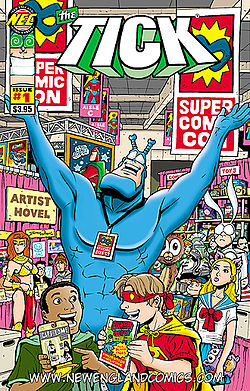
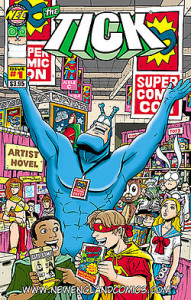


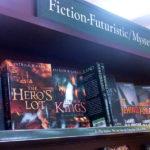





I understand and agree with the general point — that we should participate in the real world with our speculative fiction stuff. But what on earth do you mean by “nonfiction materials available for actual money”? Do you mean nonfiction books about our kind of fiction, or do you mean trinkets and baubles for fans — t-shirts, mugs, card game/RPG adaptations, etc? If you mean books, then that sounds like a significant concession to writercism, to me. Trinkets could be part of reaching out and participating with the audience, but they really are unrelated to the real storytelling, a form of fan service. Focusing too much on fan fun is not necessarily good for the genre, I think.
I suspect the explanation behind “nonfiction materials available for actual money” could take up a blog post of its own. And I hope it will, Stephen. 😉
Or a single comment, which alone could seem a bit spammy. 🙂 It occurs to me that youths and especially parents — perhaps the sole groups Christian spec authors should “target” with their offerings — would benefit from nonfiction materials, made available for Suggested Donations, that encourage Biblical approaches to fantastic fiction and debunk myths about such stories. For example, Jared Moore and I are finally wrapping up our Teaching Story Transitions series tomorrow. Once we tighten that in some places and add more to other places, we believe this could make a first-rate ebook for dealing with many un-Biblical and uniquely evangelical barricades to enjoying all kinds of stories for God’s glory.
Great blog. I wholeheartedly agree. I’ve always loved this C.S. Lewis quote: “What we want is not more little books about Christianity, but more little books by Christians on other subjects–with their Christianity latent.” This feels particularly relevant for Spec Fic authors.
Even as a new writer, I feel like there’s a perceived pressure in the CBA to check off specific elements from some mandatory list to be considered a “christian” book.
However, I love the approach that instead of criticizing what we see as flaws in the existing infrastructure, the responsibility is ours to create our own channel to the audience. As mentioned in the blog, you can’t blame the golf store or the golf store customer for not wanting to buy your amazing chair.
I’ll be marking my calendar for Realm Makers 2014.
I’m a writer of other things (romances, bildungsroman, folklore-influenced historical fiction). I read spec-fic avidly but have heretofore enjoyed only a very few spec-fic novels written from a Christ-centered worldview. So I suspect I’m the audience Realm Makers’ authors are hoping to secure.
Many of my friends attended Realm Makers and their reports have renewed my interest in the genre (that is, the subgenre of spec-fic written by those with a Christ-centered worldview.)